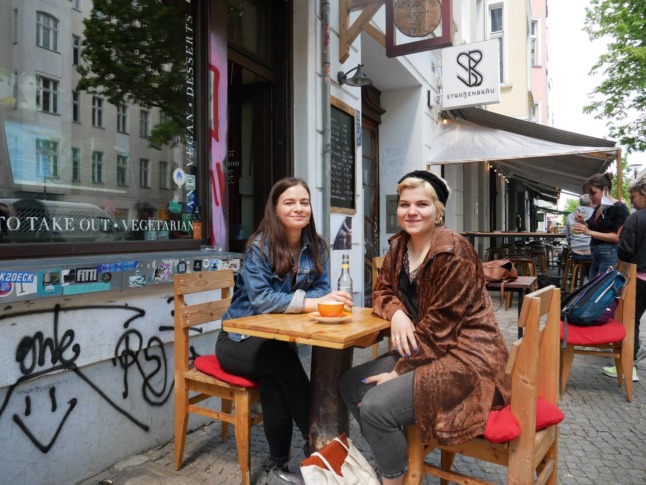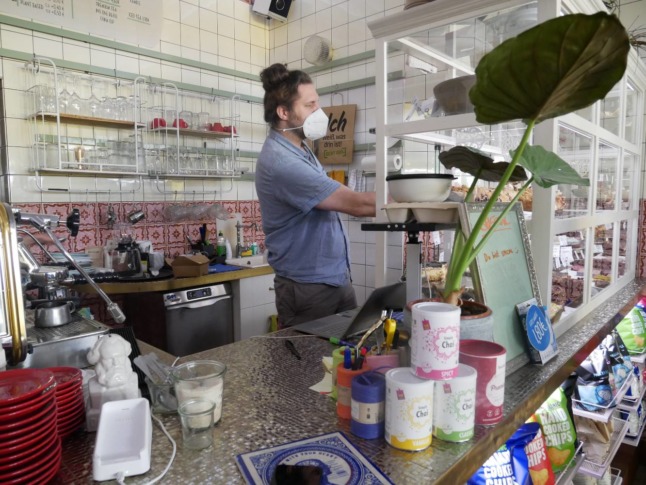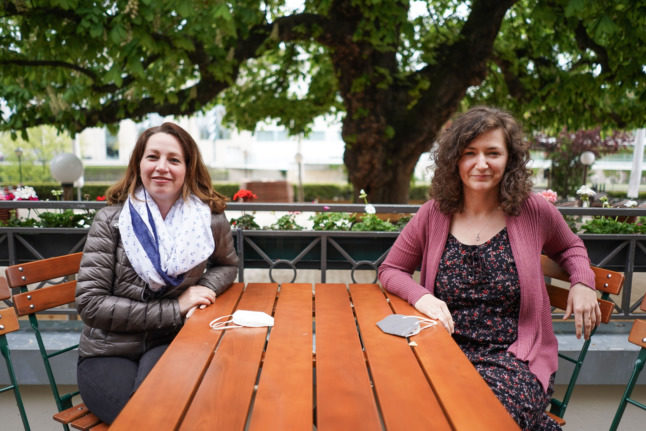It has been a very busy morning for Mauriz Weymann. He dashes around the counter, making espresso for the customers outside, while shouting the orders to the chefs at the kitchen at the back of the café.
Weymann is the owner of Genuine Treats, a small coffee shop located in the trendy district of Friedrichshain. For the first time in nearly seven months, the café is open to customers for outdoor dining.
Weymann told The Local that it has been non-stop since they opened the doors this morning.
“It is the best thing that has happened in the past one and a half years. We have been waiting for this for way too long,” he says.
READ ALSO: IN PHOTOS: How Germany is reopening after more than six months of Covid shutdown
Just outside the café, there are eight tables, which are now full of customers. Emily, one of the waitresses, rushes to serve people their meals.
After starting the job at the café in October, this is one of the first times Emily has seen it full.
“We stayed open for takeaway during the lockdown, and luckily had support from our regular customers. But it is great to be open, especially with the sun shining today.”
A slow awakening
After a continually-extended second shutdown, which began in November 2020 as a one-month “lockdown light”, the city’s cafes, bars and restaurants got permission to reopen, albeit partially, from Friday May 21st.
Like other European capitals, the city’s reduced infection rate means restrictions are easing, and other parts of normal life, including hotel and gym openings, are expected to resume in June.
For some Berliners, the excitement is palpable. Lena Heese and Charlotte Schwerdner sat outside Bagelmann Café, near Ostkreuz. They said as soon as they heard measures were relaxing this week, they made plans to come back to their favourite café.
“It feels a bit crazy and confusing to be able to sit here and drink coffee, and not have to do take-away. It is a really good feeling – like we are free again” Heese tells The Local Germany.

Charlotte Schwerdner (left) and Lena Heese (right) outside Bagelmann Cafe. Photo: Priya Sippy
But while Berliners may have some freedom back, going to a café or restaurant still has several limitations. Diners must either present a full vaccination certificate, a negative test taken within 24 hours, or a positive PCR test certificate showing recovery from an infection to be allowed entry.
READ ALSO: Germans return to pools and beer gardens after some Covid curbs are lifted
While Heese has been fully vaccinated, her friend Charlotte hasn’t – and had to take a test this morning. She says that while this was not an issue today, it may prevent her from going to places frequently in the future.
“It is difficult to find the time to be able to do the test. You cannot go to a coffee shop spontaneously anymore” she explains.
“Maybe every week I could do it, but it also depends on the cost. You can only get a certain number of free tests per week and self-testing kits can be expensive.”
Despite this, they both agree that having these restrictions in place makes them feel safer when venturing out.
“We have been really careful with sticking to the rules. So, knowing that everyone who comes here is negative feels more secure. Also we know the risk is much lower when you are outside.” Heese says.
One Covid-19 test centre in Friedrichshain says they have already seen a big increase in numbers since the easing of restrictions this morning.
“Yesterday we had 100 tests for the entire day. But today it is only 2pm and we already had 120 people,” a spokesperson tells The Local.
But not all café owners believe the restrictions are positive. Svetlana Jaehnichen, the owner of Bagelmann cafe, tells The Local that these new measures are a “disaster for the gastronomy sector”.
“Who will do all these tests to come? It takes too much time. I think it will be really difficult for restaurants to get back to their full capacity,” she says.

Mauriz Weymann from Genuine Treats. Photo: Priya Sippy
Despite this, for the first day of opening, these restrictions do not seem to be stopping Berliners take advantage of the easing measures. Just next to Friedrichshain, there is a similar buzz in Prenzlauer Berg, well-known for its cosy cafes and coffee shops. Tables and chairs line the streets and places start to fill up close to lunchtime.
Olexander Kit drank a beer with a friend while he waited for his food at Hum restaurant. Kit says that it’s not the food or drink that makes him happy but rather the social aspects.
“Restaurants and cafes are places you meet with friends to chat and spend time together,” he says. “They are social interaction points. On my cycle here it was great to see people sitting out and enjoying themselves.”
And while it seems most of the city’s cafes have opened their doors this morning, some are still waiting patiently. Café Butter, a popular café nestled on the corner of a quiet Prenzlauer Berg street says they will open for customers on May 28th.
The owner, Katja, explained that while the weather is unpredictable and outdoor dining is the only option, they will wait a couple more weeks.
“It is not so nice for customers to sit outside right now as the weather keeps changing. But we will be back soon,” she says.
“We are looking forward to that.”



 Please whitelist us to continue reading.
Please whitelist us to continue reading.
Member comments